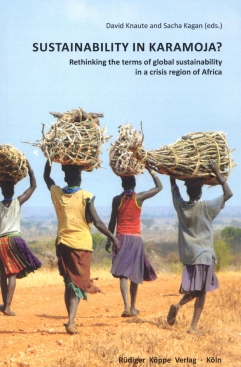


The Karamoja region of Uganda is not well-known, yet it suffers from one of the most severe and chronic crisis in Africa. Almost 30 years after the historical famine of 1980, political and ecological factors still intermingle, placing the pastoralist livelihood of a million Karimojong under unprecedented stress.
Stemming from five international conferences as part of a year of active campaigning across Europe, this publication looks at global responsibilities and explores local, national and international solutions that may pave the way to sustainability and conflict mitigation. With contributions by an interdisciplinary selection of researchers and experts, and a confrontation of European and African cases, it also reveals opportunities and challenges for pastoralist societies worldwide.
Aid workers, researchers, students, decision-makers and other people concerned with Africa, nomadic lifestyles or the effects of climate change will find inspiring, yet challenging perspectives that together cast a new light on the complexity of humanitarian crises and human development. The forewords are written by Louis Michel, European Commissioner for Development and Humanitarian Aid, and Elizabeth Paula Napeyok, Ambassador Extraordinary and Plenipotentiary of the Republic of Uganda to France, Spain, Portugal and Permanent Delegate to UNESCO.
CONTENTS
Louis Michel / Elizabeth Paula Napeyok: Foreword
David Knaute: Rethinking Sustainability in Pastoralist Areas of East Africa – Introduction
PART ONE – Searching for Sustainability in Karamoja
Chapter 1
David Knaute: Literature Review on Karamoja (Period 1943–2008)
Chapter 2
Sacha Kagan / Liv Pedersen / Sally Ollech: The Karamoja Syndrome – Transdisciplinary Systems Research Informing Policy and Advocacy
Chapter 3
Under the guidance of ACTED / Leuphana University Lüneburg: Reaching the Frontiers – Perspectives on Sustainable Development Strategies in Karamoja
PART TWO – Pastoralism Globally and Locally
Chapter 4 · Pastoralism and Development in the Age of Globalization – Comparative Perspectives from Europe and East Africa
Hubert Beckmann / Jesús Garzón Heydt: Transhumance as a Tool of Species Conservation in Times of Climate Change
Jorge Guerra González: Interculturality as Background for Sustainability
Mark J. Dwyer / Kirill V. Istomin: Technological Carrying Capacity Renders Ecological Carrying Capacity a Redundant Concept in Pastoralist Systems? A Case Study of ‘Overgrazing’ amongst Komi and Nenets Reindeer Herders
Sylvain Froidevaux: Cattle Raiding and Black Market – From Sociocultural Practice to Subversive Sociability in African Postcolonial Context
Wario R. Adano: Development Policies, Reactive Aid and Indigenous Institution of Livestock Sharing among East African Pastoralists
Nene Mburu: Ilemi Triangle, the Complexityof Disarming ‘Fragmentary’ Societies
Wolde Wendessen Gulelat: The Role of NGOs in Pastoral Advocacy – Experiences of Pastoralist Forum Ethiopia
Marion Rolle: The Forgotten Perspective of Climate Policy – Women and Climate Change – The Example of Tanzania
Chapter 5 · Multifaceted Perspectives on the Karamoja Crisis
Mario Cisternino: How the Karimojong Pastoralists Manage Their Territory – The Ecological Circle of the Pastoralists and the Social Structure Holding it Together
Ben Knighton: Can Notions of Common Property and the Common Good Survive? The Consequences of Classical Economics for Karamojong Nomadic Pastoralists
Itsuhiro Hazama: Disarmament Policies for Ending Armed Conflict in an East-African Pastoral Society
Evelyn Mathias / Thomas Loquang / Ilse Köhler-Rollefson: Community-based Breed Documentation as a Tool for Empowerment – The Example of Karamoja
Jeanne T. Gradé / R.B. Weladji / P. Van Damme: Embracing Ethnoveterinary Knowledge Diffusion in Karamoja, Uganda – A Strategy to Strengthen
James Lemukol: Health Care Delivery to a Semi-nomadic Population – The Experience of Karamoja
Sandra Gray: Economic Activities of Karimojong Men and Women in Two Villages in Moroto District, August–December, 2004
PART THREE – Thinking out of the Box – Cultural Strategies for Awareness Raising
Chapter 6 · Examples from the Karamoja Campaign
Karl Lakolak: Karamojadream
Sylvain Froidevaux: Caution Border – Art Intervention by the CCC Research-based MA Programme at Geneva University of Art and Design (HEAD)
Lena Wäbs: Learning Interculturality – A Cultural Exchange between a Gymnasium in Germany and a ABEK school in Karamoja
Sacha Kagan: Land of Thorns – A Filmic Attempt to Mediate Issues of (Un-)sustainable Development
Sacha Kagan / David Knaute: A Photographic Exploration of Karamoja
The work is well intentioned, with the important goal of improving the lot of pastoralists, specifically the Karamojong, by advocating for the acceptability and even benefit to society of their nomadic lifestyle.
Lorelle Beth Jabs in African Affairs, 110/439, 2011, 315-316
© 2026 by Rüdiger Köppe Verlag – www.koeppe.de